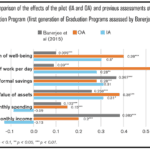Building a Transformative Gender Approach into Graduation Programs: Lessons Learned from a Three-Year Initiative in Latin America
Latin America is one of the most unequal regions in the world, with 86 million people living in extreme poverty. The COVID-19 pandemic has accentuated these inequalities in the region, especially affecting women. For example, estimates for 2021 indicate that one in two women did not participate in the labor force, and that female unemployment was 11.8% – 3.7 percentage points higher than male unemployment.
This situation is complex and structural, and it is related to different pervasive problems in countries across the region. In Paraguay, to take just one example, these problems include:
- Violence against women: Since the beginning of the pandemic, the number of cases of domestic violence in the region has increased, and Paraguay is no exception. In 2020, according to data from the Ministry of Women, calls to the domestic violence hotline “137 SOS Mujer” increased by 78% compared to the same period in the previous year.
- Teenage pregnancy: Paraguay has had the highest teenage pregnancy rate in the Southern Cone (Argentina, Brazil, Uruguay, Chile and Paraguay): 72 births per 1,000 women between 15 and 19 years old. Though this trend is concentrated among low-income adolescents, it not only affects young women’s aspirations and participation in the labor market, it also affects society as a whole.
- Income and employment asymmetries between men and women: In Paraguay, the wage gap continues to disadvantage women. For example, the average monthly income of men is 19.2% higher than that of women. In addition, the unemployment rate affects women to a greater extent, as 9.9% are unemployed compared to 4.8% of men.
To find solutions to these significant challenges, Fundación Capital believes it is necessary to address their multidimensional causes, and to seek to generate a systemic impact on communities. In other words, it’s essential to work toward change that addresses the root causes of the urgent challenges faced by people living in poverty, through collaborative work with key stakeholders. To that end, academic evidence has shown that Graduation programs can contribute to overcoming poverty and strengthening resilience in extremely vulnerable households around the world.
More recent findings suggest that integrating a transformative gender approach into these programs can amplify their impact: By focusing not only on the digital, financial and economic inclusion of women, but also on the cultural norms that limit their full development, this approach can help close gender gaps and build more equitable communities.
Fundación Capital has worked to implement Graduation programs with a gender approach in different countries, such as Paraguay, Honduras and Colombia. Below, we’ll discuss some of the actions these programs have taken, and the lessons we have learned from this work.
Building Graduation Programs with a Transformative Gender Approach
Graduation programs provide an opportunity to contribute to strengthening resilience, mainly of women, and to support the economic development of the most vulnerable households. The Graduation Program Evaluation and Learning Platform for Latin America, funded by the International Development Research Center (IDRC), has conducted rigorous studies that have demonstrated these programs’ impact in Latin America, in relation to socioeconomic variables such as income, consumption, savings, access to formal financial markets, productivity, and even well-being and food security. But despite their proven impacts, these programs must do more than simply target women in their outreach if they hope to address gender inequalities: Instead, they must address the causes of these inequalities from a structural point of view, going beyond economic-centric narratives.
How can Graduation programs include a transformative gender approach, and go beyond the targeting of women in the programs? And how can they measure this impact, in order to understand and improve this approach? These questions motivated the team at Fundación Capital and IDRC to create and implement the initiative “Towards Transformative Gender Graduation Programs.” This initiative can help us better understand how Graduation programs can better contribute to gender equality among the most economically vulnerable households, empower women more effectively, and change the gender norms, behaviors and attitudes that hinder women’s well-being.
Between 2019 and 2021, the initiative worked in collaboration with the Ministry of Children and Adolescents in Paraguay to implement a Graduation strategy with a transformative gender approach within the ministry’s Abrazo Program, targeting women from populations living in poverty. The objective was to promote the economic resilience of 1,000 families (by strengthening their productive capacities, and creating and improving small businesses), as well as to prevent gender-based violence through the digital application IgualdApp. The app was developed by Fundación Capital, with a cross-cutting focus on transforming gender stereotypes and roles that reinforce the dynamics of inequality.
In addition, we evaluated interventions with gender components in Colombia and Honduras, and promoted the exchange of knowledge on transformative gender approaches in Graduation programs among policymakers, practitioners, researchers and the global community of practice that has emerged around this type of program. We also conducted several studies related to this approach, and to the importance of technology in addressing gender issues that remain taboo – especially in socially conservative societies and in the context of the COVID-19 pandemic.
Overcoming Inequalities for Systemic Economic Empowerment
Achieving a change of the gender-related mentality and values rooted in a community requires the commitment and trust of multiple stakeholders, starting with governments and involving international organizations, nonprofits and social enterprises, and academics. After three years of work, the “Towards Transformative Gender Graduation Programs” initiative achieved important results, and the project participants learned several key lessons, which we’ll discuss below – along with some remaining challenges.
LESSONS LEARNED BY THE PARTICIPANTS
- The impact of gender stereotypes: The program motivated important reflections among participants on gender stereotypes related to upbringing. For instance, it encouraged the belief that boys and girls should be able to play with different toys and use different colors (not only those wrongly associated with a specific gender), as overcoming this sort of stereotype is important for them to develop their full human potential.
- The value of addressing sexual and reproductive health issues: The participants appreciated the access the program provided to clear and accurate information on contraceptive methods, because it gave them talking points they could use to convince their partners of the importance of using these methods, such as pointing out that it is a shared responsibility.
- The impact on participants’ savings and budget management: We identified two areas where the program delivered results. In vulnerable populations that do not have access to formal savings systems, self-managed savings groups of 15 to 25 people meet regularly to keep their money in a safe space and access small loans. Many women in the program participate in these savings groups, and among these participants, many concluded that it was possible to generate savings habits, and identified the importance of saving to manage emergency situations, such as the pandemic. Additionally, they developed different techniques to control spending within the household. For instance, many participants mentioned that they were able to manage their children’s spending on unhealthy food consumption more effectively.
REMAINING CHALLENGES
- Women’s limited participation in public spaces: The project demonstrated that women’s participation in public spaces, such as government and policy making, depends on the better balance and distribution of household activities through greater participation of all household members.
- Other key issues to consider: The program identified several other challenges that deserve greater attention, including the normalization of violence – in public spaces, at work and, of course, in the domestic environment. Although the initiative’s IgualdApp application helped some participants recognize that there are different forms of violence, and that it is important to avoid reproducing certain patterns of violence in parenting, during the fieldwork it became evident that there are some forms of violence that are often socially accepted, and that this acceptance is ingrained.
Given the transformative results Graduation programs can deliver in vulnerable communities, incorporating a gender approach into these programs will be an essential part of maximizing their impact over the long term. To that end, the “Towards Transformative Gender Graduation Programs” initiative took some important first steps, helping us understand the most effective way to generate sustainable social transformations that provide women with the appropriate resources to overcome poverty, and that give them greater well-being and decision-making power in their communities and homes. Replicating these approaches and acting on this growing understanding can help us design more effective Graduation programs, through a collective process between social organizations, governments, academia and communities. Over time, these programs will allow us to continue building more equitable and just societies, not just in Latin America, but around the world.
Laura Morínigo is a Project Manager and Carolina de Miranda is Director of the Social and Livelihood Promotion Department at Fundación Capital.
Photo courtesy of Fundación Capital.
- Categories
- Finance, Technology



